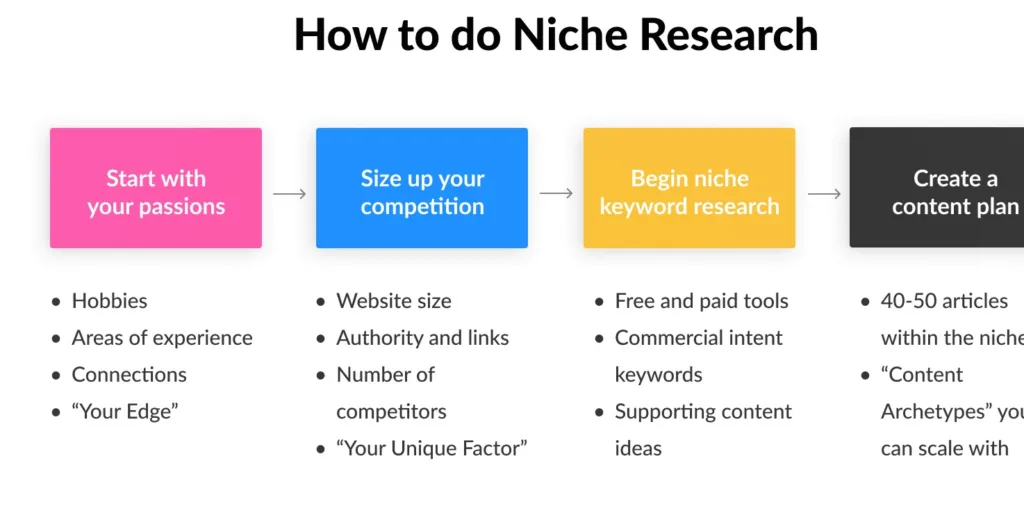Choosing the right niche is a crucial step in building a successful affiliate marketing business. A niche determines the target audience you will cater to and the products or services you will promote. Finding a niche that aligns with your interests, has market demand, and offers profitable opportunities can set the foundation for your affiliate marketing success. In this comprehensive guide, we will walk you through the process of easily finding a niche for affiliate marketing.

How to Easily Find a Niche for Affiliate Marketing
Understanding the Importance of Niche Selection
In this section, we discuss why niche selection is vital for affiliate marketing success. We highlight the benefits of targeting a specific audience and the potential for higher conversion rates and audience engagement.
Assessing Your Interests and Passions
We explore the importance of choosing a niche that aligns with your interests, expertise, and passions. We provide guidance on assessing your knowledge, skills, and hobbies to identify potential niches that you will genuinely enjoy working on.
Researching Market Demand
This section focuses on conducting thorough market research to determine the demand for your potential niche. We delve into identifying evergreen niches that have consistent demand, analyzing trends and seasonal niches, and evaluating niche competition.

Analyzing Profit Potential
Here, we guide you through assessing the profit potential of your chosen niche. We discuss factors such as commission rates offered by affiliate programs, the price range of products or services within the niche, and the disposable income of your target audience.
Validating Niche Viability
We delve into the process of validating the viability of your chosen niche. We explain the importance of keyword research and search volume analysis, exploring online communities and forums related to the niche, and evaluating social media engagement within the niche.
Considering Your Expertise and Unique Value Proposition
We emphasize the importance of leveraging your expertise and unique value proposition when choosing a niche. We guide you in identifying your strengths, skills, and experiences that can set you apart from competitors within your chosen niche.
Brainstorming and Narrowing Down Niche Ideas
In this section, we provide practical tips and strategies for brainstorming and narrowing down your niche ideas. We discuss techniques such as mind mapping, conducting SWOT analysis, and seeking feedback from others.
Testing and Refining Your Chosen Niche
Once you have selected a niche, this section outlines the importance of testing and refining your approach. We highlight the significance of continuously evaluating your niche’s performance and making necessary adjustments to optimize your affiliate marketing efforts.
To test your chosen niche, start by creating a website or blog dedicated to the niche. Develop high-quality content that caters to the needs and interests of your target audience. Incorporate relevant affiliate links and track their performance using analytics tools.
Monitor key metrics such as website traffic, click-through rates, conversion rates, and affiliate sales. Analyze the data to identify areas for improvement and to understand which products or content resonate best with your audience.
Based on your findings, refine your niche strategy. This may involve narrowing down your niche further, focusing on specific sub-niches, or diversifying your content to cater to different segments of your audience. Experiment with different types of content, promotional strategies, and affiliate programs to find the most effective approaches.
Additionally, pay attention to feedback from your audience. Encourage them to leave comments, ask questions, or provide suggestions. Engage with your audience through social media platforms, email newsletters, or online forums to understand their preferences and pain points better.
Continuous testing and refinement are key to staying relevant and competitive in the affiliate marketing landscape. As you gather more data and insights, you can make data-driven decisions to optimize your niche selection, content creation, and affiliate partnerships.
Frequently Asked Questions
1: How do I choose a profitable niche?
Choosing a profitable niche is a crucial step in building a successful affiliate marketing business. Here are some key considerations to help you choose a profitable niche:
Market Demand: Research and identify niches with high market demand. Look for products or services that solve a problem or fulfill a need for a specific target audience. Niches with a passionate and engaged audience tend to have higher demand and are more likely to generate sales.
Competition Analysis: Evaluate the competition within your potential niches. While some competition is healthy, too much competition can make it difficult to stand out. Look for niches with a manageable level of competition where you can offer a unique value proposition and differentiate yourself from others.
Profit Potential: Assess the profit potential of the niche by considering factors such as commission rates offered by affiliate programs, the price range of products or services within the niche, and the disposable income of your target audience. Higher-priced products with attractive commission rates and an audience with purchasing power can lead to more profitable affiliate marketing.
Target Audience: Understand your target audience’s needs, preferences, and purchasing behavior. Choose a niche that resonates with your target audience and aligns with their interests. By catering to a specific audience, you can build a loyal following and create content that addresses their unique challenges and desires.
Evergreen vs. Trending Niches: Consider whether you want to focus on evergreen niches or trending niches. Evergreen niches have consistent demand over time, while trending niches experience surges in popularity but may fade away. Both options have their pros and cons, so choose based on your long-term goals and preferences.
Passion and Knowledge: Select a niche that aligns with your passions and expertise. When you have a genuine interest and knowledge in the niche, it becomes easier to create valuable content, engage with your audience, and build trust. Your enthusiasm will shine through your marketing efforts, leading to better results.
Keyword Research: Conduct keyword research to identify popular search terms and assess the potential for organic traffic. Look for keywords with a good search volume and reasonable competition. This will help you understand the demand for content related to your niche and optimize your website for search engines.
Remember that profitability is not guaranteed solely by the niche choice. Success in affiliate marketing requires consistent effort, quality content, effective marketing strategies, and building trust with your audience. Continuously monitor and adapt your approach to stay ahead of the market trends and consumer demands within your chosen niche.
2: What is the most competitive niche?
Determining the most competitive niche in affiliate marketing can be subjective and may vary depending on factors such as industry trends and market dynamics. However, some niches tend to be highly competitive due to their popularity and profitability.
One of the most competitive niches is the technology niche. The technology industry is vast and encompasses various sub-niches such as smartphones, laptops, gaming, software, and more. It attracts a large number of affiliates and companies vying for the attention of tech-savvy consumers. The constant evolution and rapid advancements in technology contribute to its high competitiveness.
Other competitive niches include health and wellness, fitness, personal finance, and beauty. These niches have broad appeal and attract a significant number of affiliates and consumers. They offer a wide range of products and services, making it essential for marketers to find unique angles or target specific sub-niches within these categories to stand out from the competition.
The level of competition within a niche can vary based on factors such as the number of established players, the quality of content and marketing strategies employed, and the strength of brand recognition. It’s important to note that while these niches are highly competitive, they also offer great potential for profitability due to their large target audience and high demand for products or services.
When entering a competitive niche, it’s crucial to differentiate yourself by providing valuable content, focusing on a specific audience segment, or finding unique angles to promote products. Building a strong brand, establishing authority, and cultivating a loyal audience can help you thrive even in the face of fierce competition.
3: How do you validate a niche idea?
Validating a niche idea is an essential step in affiliate marketing to ensure its viability and potential for success. Here are some key methods to validate a niche idea:
Market Research: Conduct thorough market research to understand the demand and competition within the niche. Analyze industry reports, consumer trends, and competitor analysis to assess the market size, growth potential, and profitability of the niche.
Keyword Research: Perform keyword research to identify the search volume and competition for relevant keywords in your niche. This helps gauge the level of interest and demand from potential customers. Look for keywords with a reasonable search volume and manageable competition to indicate potential traffic and interest.
Audience Engagement: Engage with your target audience to gauge their interest and receptiveness to the niche idea. Use online forums, social media platforms, and communities to interact with potential customers and gather feedback on their needs, pain points, and preferences. This will help you refine your niche idea and align it with their requirements.
Product Availability: Evaluate the availability of products or services within the niche. Research affiliate programs, vendors, or merchants that offer relevant products and assess their reputation, commission rates, and product quality. Ensure there are enough options to promote and monetize your niche effectively.
Test Campaigns: Conduct test campaigns to measure the response and engagement from your target audience. Create sample content, landing pages, or advertisements to assess the click-through rates, conversion rates, and overall interest in the niche. Monitor the results and make data-driven decisions on whether to proceed with the niche idea or make necessary adjustments.
By validating a niche idea through thorough research, audience engagement, and test campaigns, you can gain confidence in its potential for success. Remember that validation is an ongoing process, and you should continuously monitor market trends, customer feedback, and competition to adapt and refine your niche strategy accordingly.
4: How do I find an online business niche?
Finding an online business niche involves a systematic approach to identify a target market with specific needs and opportunities. Here are some steps to help you find an online business niche:
Identify your passions and expertise: Start by reflecting on your interests, skills, and knowledge. Consider areas where you have a genuine passion or expertise, as this can give you a competitive advantage and make your business more enjoyable.
Research market trends: Stay updated on market trends and emerging industries. Look for areas with growing demand, untapped markets, or gaps that you can fill with your products or services.
Analyze competition: Study your potential competitors within different niches. Assess their strengths, weaknesses, and the saturation level of the market. Look for opportunities where you can differentiate yourself and provide unique value.
Define your target audience: Determine who your ideal customers are. Understand their demographics, interests, pain points, and buying behavior. This will help you tailor your products, marketing messages, and customer experience to meet their specific needs.
Conduct keyword research: Use keyword research tools to identify popular search terms related to your potential niches. This can help you gauge the level of interest and competition in different niches and identify specific keywords to target in your online presence.
Validate your niche: Engage with your target audience through surveys, online communities, or social media platforms to validate the demand for your niche. Seek feedback, understand their challenges, and ensure there is a viable market for your products or services.
By following these steps and combining your passion with market research, you can find an online business niche that aligns with your interests and has the potential for profitability and success.
Determining the most popular niche on social media can be subjective and may change over time. However, there are a few niches that have consistently gained popularity and engagement on social media platforms:
Fitness and Wellness: The fitness and wellness niche has a large following on social media. People are interested in health, fitness routines, diet tips, and overall well-being. Influencers and brands in this niche often share workout videos, healthy recipes, and motivational content.
Fashion and Beauty: Fashion and beauty are highly visual niches that thrive on social media. Users enjoy following influencers who showcase their unique style, share fashion tips, makeup tutorials, and product reviews. This niche attracts a wide audience, including fashion enthusiasts, beauty lovers, and those seeking style inspiration.
Travel and Adventure: Social media has become a hub for travel inspiration. Travel influencers share captivating photos, destination recommendations, and travel tips. The allure of beautiful landscapes, thrilling experiences, and cultural exploration make travel and adventure a popular niche on platforms like Instagram and YouTube.
Food and Cooking: Food-related content has gained immense popularity on social media. Users enjoy watching cooking videos, trying new recipes, and discovering food trends. Food bloggers, chefs, and home cooks share their culinary creations, restaurant recommendations, and cooking hacks, attracting a dedicated following.
Personal Development and Motivation: The personal development niche has seen significant growth on social media. Influencers in this space share motivational quotes, self-improvement tips, and strategies for success. Users appreciate content that inspires, educates, and helps them achieve personal and professional growth.
It’s important to note that the popularity of niches on social media can vary based on platform, cultural trends, and user preferences. It’s essential to stay updated on current trends, conduct market research, and understand your target audience to choose a niche that aligns with your interests and has the potential for engagement and growth.
Conclusion – How to Easily Find a Niche for Affiliate Marketing
In conclusion, finding the right niche for your affiliate marketing business is a crucial step towards achieving success. By following the steps outlined in this guide, you can easily identify a niche that aligns with your interests, has market demand, and offers profitable opportunities.
Remember to assess your passions and expertise, conduct thorough market research, analyze profit potential, validate niche viability, and consider your unique value proposition. Embrace testing and refinement as an ongoing process to optimize your niche strategy and ensure long-term success.
Affiliate marketing is a dynamic and ever-evolving industry, so stay informed about market trends, consumer behavior, and emerging niches. Continuously adapt and adjust your strategies to meet the changing needs and preferences of your audience.
With a well-chosen niche and a focused approach, you can build a thriving affiliate marketing business that generates consistent income and provides value to your audience. Take the time to find the niche that excites you and aligns with your goals, and you’ll be well on your way to affiliate marketing success.
